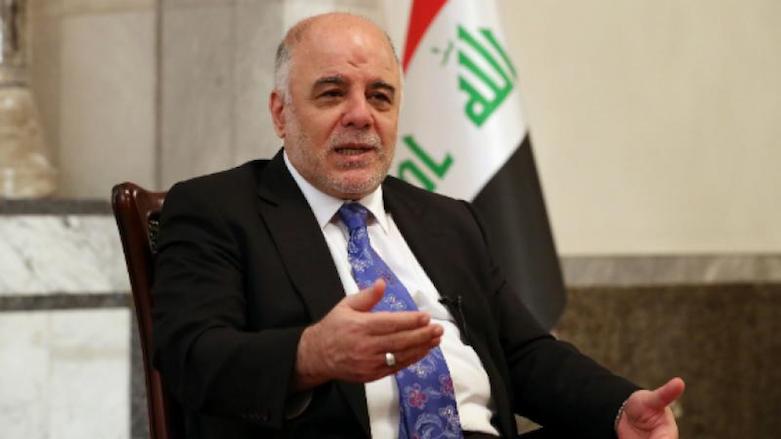Has Haider al-Abadi overplayed his hand?

WASHINGTON DC, United States (Kurdistan 24) – Since the Sep. 25 Kurdish referendum, Iraqi Prime Minister Haider al-Abadi has taken an extraordinarily harsh stance toward the Kurdistan Region.
Abadi abuses the Kurds, hoping to win votes among the Shias, even as he also needs support from the Kurdish parties to win the next parliamentary elections, slated to be held in May.
Abadi is an inexperienced politician. He has never won a national election. He received only 4,000 votes in the 2014 parliamentary elections, but became Prime Minister, following the Islamic State’s (IS) surge into Iraq.
As a condition of US support in the fight against IS, Washington demanded that Nuri al-Maliki resign as Prime Minister. Iraq’s parliamentarians then accommodated the US request to name Abadi as his replacement.
However, there are serious questions now as to whether Abadi is overplaying his hand—acting like Maliki, as a sectarian leader. Abadi’s roots are in al-Dawa, a Shia religious party. He was Maliki’s deputy in the party before Maliki stepped down.
The Iraqi parliament now has two critical issues before it. One concerns the budget and the other involves elections.
Kurdish and Sunni Arab MPs boycotted Wednesday’s parliamentary session. Consequently, it lacked a quorum, and the session could not be held.
The Speaker of Parliament, Salim al-Jubouri, a Sunni Arab, then convened a closed session with the major players and political parties.
Like the Kurds, the Sunnis have their complaints about Abadi and view him as a sectarian figure who favors his own Shia constituency while discriminating against them.
A Kurdish MP familiar with Wednesday’s meeting explained to Kurdistan 24 that it was decided not to hold a vote on either contested issue. Instead, those participating in the meeting decided to form a committee to resolve the problems through consensus and dialogue.
The committee is then to meet with Abadi and reach an acceptable compromise, rather than have him dictate to Parliament.
Regarding the budget, the Kurdistan Region is supposed to receive 17 percent of Iraq’s revenues, based on a 2005 census. No census has been held in the years since, yet Abadi arbitrarily slashed the Kurdish share to 12.6 percent—as if it was simply his prerogative to do so.
The Kurdistan Regional Government (KRG) has protested. So, too, has the International Monetary Fund, saying the 12.6 percent figure will not meet the KRG’s needs.
Moreover, Abadi’s budget advantages Baghdad, raising the discontent of the Sunni MPs as well.
This May’s elections will be the first since 2014—when IS attacked Iraq and occupied a third of the country.
Sunni MPs want the elections postponed because a very large proportion of the Sunni population remains displaced—in refugee camps. Arrangements need to be made to ensure they can vote.
Kurdish MPs are sympathetic. Over 180,000 Kurds were displaced after Iraq’s attack on Kirkuk and other disputed areas on Oct. 16. Additionally, Baghdad has begun an “Arabization” program, moving people to Kirkuk from the south to change its demographic composition.
The only party which insisted strongly on holding the elections as scheduled was the Badr Organization, this MP explained. Badr believes that its candidate—Hadi al-Amiri—has a very good shot at winning the elections.
Amiri is America’s nightmare. He heads the Popular Mobilization Forces (PMF), the overwhelmingly Shia militias in Iraq formed to defend the country in the wake of IS’ assault.
The most powerful PMF are trained and supported by Iran and subject to Iranian command. Amiri, as head of the Badr Organization, has long-standing ties to Iran, going back to the 1980s and the Iran-Iraq war.
In November, during an interview with Iranian television, Amiri said Iraq would not allow “even one US soldier” to remain in the country, now that IS was defeated.
Yet, Amiri may well be the most popular Shia leader in Iraq.
Thus, Abadi needs the Kurds, as well as the Sunnis, if he is to prevail in the next elections. So, why is he so abusive and sectarian?
Some informed Iraqis, Sunnis as well as Kurds, believe that events have simply swelled his ego. He believes he defeated IS—although others would, arguably, have a greater claim to that honor.
Abadi enjoys the support of the US, and, for now, the support of Iran. So, he is free to act as he chooses, without much regard for the sensibilities of Iraq’s minority populations.
Others suggest Abadi is acting at Iranian direction. Tehran wants to bring Iraq’s Kurds to heel because it has its own restive Kurdish minority. And, that seems to be what Abadi is seeking to do.
Of course, the explanations are not mutually exclusive. But, whatever the case, there is a problem. Abadi is “not strong anymore” and “not popular,” this Kurdish MP told Kurdistan 24.
He also had some advice for Washington: “The US should realize that Abadi is not the person to support” in the next round of elections.
Editing by Karzan Sulaivany
